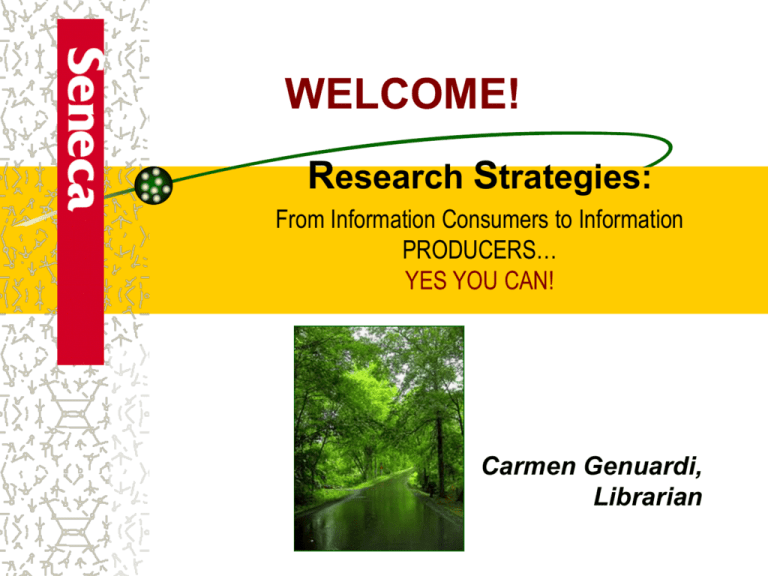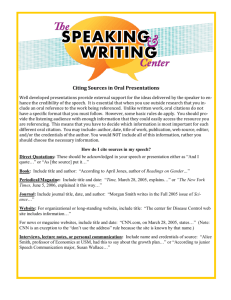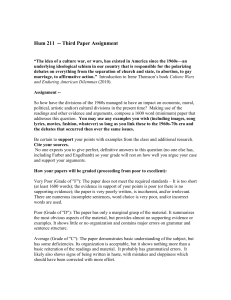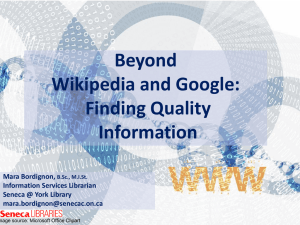
WELCOME!
Research Strategies:
From Information Consumers to Information
PRODUCERS…
YES YOU CAN!
Carmen Genuardi,
Librarian
From Information Consumers to Information PRODUCERS…
YES YOU CAN!
It’s all a click away! Everything I need is on the Internet…
– Do I Trust this Information? Criteria for Evaluating information sources
Citing Sources to Avoid Plagiarism
Seneca Library Catalogue
Finding books, e-books, and more…(Give it a try!)
Steps to Doing Research
Let’s Review: Library Jeopardy!
Please feel free to ask me questions as we go.
It’s All Just A Click Away
Everything I need is on the Internet…well, think
again!
Would you drive across a bridge constructed
entirely on the basis of information obtained by
searching Google?
Would you want a doctor to operate on you using
instructions somebody found on Yahoo!?
Is This Credible?
http://www.genochoice.com/
Criteria for Evaluating your sources
Authority/Reliability?
Bias/Objectivity?
Currency?
Relevance?
Next steps
next steps
Some rights reserved (Malingering)
What’s the big deal about Plagiarism?
At Seneca College, plagiarism includes:
“Using someone else’s work (words, images, ideas,
phrases, signatures, or computations) and
presenting it as one’s own, instead of properly
documenting every source.”
Seneca College Academic Policy. Retrieved September 7, 2005, from
http://www.senecacollege.on.ca/home/academic_policy/0405_09cheat.html
Plagiarism & Citing Sources
When writing a report, essay or presentation, it is
important that you cite your sources in order to avoid
plagiarism and respect academic honesty.
Use a standard format to cite your sources, such as
MLA or APA....ask your professor which he/she prefers.
Quick guides to MLA or APA style
…
Seneca Libraries Quick Guides to APA or MLA
Plagiarism
Plagiarism includes:
Buying or taking and submitting papers written by others as your own
Copying parts of someone’s work without giving credit
Replacing only some words in another’s passage, without giving
credit
Putting together ideas from many different people without giving
credit
Using your own paper in more than one course
Cite your Sources
(aka Academic Integrity)
Professor Bill Taylor’s A Letter to My Students, reads:
“I don’t expect you to do original research. Instead, I
expect you to read about the research of others, and
bring together their ideas in such a way that makes
sense to you and will make sense to me. Therefore,
it’s essential for you to cite your sources in any
research paper you write….So don’t feel you need to
hide the fact that you’re drawing from one of your
sources. That’s what it’s all about.”
(Oakton Comm. Coll., IL) (full text at www.mcgill.ca/integrity)
Avoiding Plagiarism
Avoid Plagiarism by:
1. Keeping good research notes
2. Organizing your paper carefully
3. Acknowledging all your sources
4. Understanding and effectively using a citation
style
Consequences of Plagiarism
Consequences of plagiarizing may include:
Receiving a mark of “zero” on the assignment
Failing the course
Suspension from Seneca College
Being expelled from Seneca College
Take a moment…questions??
What if you wanted to …
…find books or e-books on the topic of “college success”,
to prepare for your college year at Seneca?
Keywords:
Note taking
Study skills
Citing sources
Time management
College student
Seneca Libraries Web Site
Finding
Books using
the Library
Catalogue
Ask us
your
research
questions
online.
10 Minute Quick Exercise
For instructions, please refer to
Part A of your handout.
Use different sources of
information…
“Usually when doing research, I refer to all forms of information! I do
this so that I can cross reference my information and rid my
research of any bias, or opinionated information.” Jessica, College
Student
Books
*Journal
Articles
Encyclopedias,
Dictionaries, etc.
Newspaper
Articles
*Magazine
Articles
What’s the difference?
Scholarly Journal Article
OR Magazine Article
Journal Articles
OR
Magazine (Popular)
Articles
Let’s have a look at your handout…
Journal Articles
Magazine Articles
Main purpose is to report results of
original research.
Information provided is usually of current
or general interest.
Author is an expert researcher in
field.
Author is usually a staff writer or
journalist who may or may not have
subject expertise.
Articles usually have narrow subject
focus.
Little or no information about sources are
provided.
Articles are written for researchers,
students, professionals.
Articles tend to be short—less than 5
pages.
Sources always cited in detail with
consistent formatting.
Intro to Research in 5 Easy Steps
Step 1: Understand research assignment requirements
Step 2: Define your topic
Step 3: Locate quality resources for your assignment
Step 4: Evaluate what you find
Step 5: Always Cite the Sources Used
Let’s refer to your handout for explanations.
ANY QUESTIONS?
Thank you!
Have more
questions?
Contact
me…
Carmen Genuardi,
Carmen.genuardi@senecac.on.ca
416-491-5050 ext. 5194
Library Jeopardy!!
Let’s
REVIEW
what
We have
learned!






